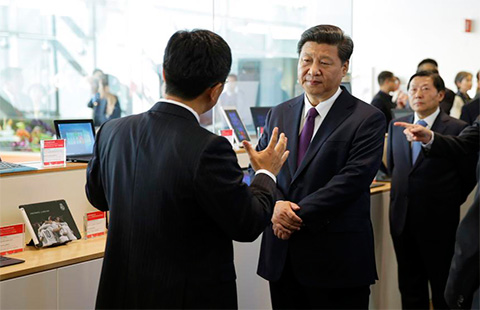Ethnic equality, unity and development in Xinjiang
Updated: 2015-09-25 06:33
(China Daily)
|
||||||||
II. Upholding Ethnic Equality and Unity
Since its establishment in 1955, the Xinjiang Uygur Autonomous Region has remained committed to supporting and improving the system of ethnic regional autonomy. It has implemented China's ethnic policies, endeavored to promote the unity and common prosperity of various ethnic groups, and developed and consolidated the new type of socialist ethnic relations of equality, unity, mutual assistance and harmony.
The principle of equality among all ethnic groups has been upheld. All ethnic groups in China, regardless of the sizes of their population and levels of development, are equal. They enjoy equal rights and are required to fulfill the same obligations in accordance with the law. The establishment of the system of ethnic regional autonomy served to protect the legitimate rights and interests of ethnic minorities and safeguard the equal rights and interests of individual citizens. People of all ethnic origins in Xinjiang are ensured an equal legal status. They enjoy the rights to vote and stand for election as prescribed by the Constitution and the law, the right of equal participation in the administration of state affairs, the right of religious belief, the right to receive education, the right to use their own spoken and written languages, the right to inherit and carry on the traditional culture of their own ethnic groups, etc.
The region has focused on eliminating ethnic misunderstandings carried over from the past; it has firmly opposed any form of ethnic oppression or discrimination, and outlawed any action that might sabotage ethnic unity or incite ethnic separatism. In addition to respecting and protecting the rights and interests of all ethnic peoples within their jurisdiction, governments of ethnic autonomous areas at various levels shoulder at the same time the responsibility of safeguarding national unification, ethnic unity and social stability.
Internal affairs of the ethnic autonomous areas are administered independently. Home to more than a dozen major ethnic groups, the Xinjiang Uygur Autonomous Region is the only autonomous region in China with three levels of autonomous administrative divisions (region, prefecture and county). It boasts five autonomous prefectures, six autonomous counties and 42 ethnic townships. The people of each ethnic autonomous area elect their own deputies to the people's congress and form the self-government organs of power to exercise the right to manage their own internal affairs. In the composition of deputies to the people's congresses and the appointment of officials, the region's self-government organs at each level have always adhered to the principles of equal participation and common management. In 2014, the 550 deputies to the 12th People's Congress of the Xinjiang Uygur Autonomous Region came from 14 ethnic groups, with 66 percent being ethnic minorities themselves, three percentage points higher than the proportion of the total population of all ethnic groups in Xinjiang. Of nine chairperson and vice chairpersons of the Standing Committee of the current regional people's congress, six are citizens of ethnic minority origins. In Xinjiang now, the heads of the autonomous region, all the autonomous prefectures and all autonomous counties are citizens from the ethnic group(s) exercising regional autonomy in the areas concerned. Moreover, an overwhelming number of the heads of other prefectures, cities and counties are citizens of ethnic minority origins. Ethnic groups in Xinjiang also enjoy the right of equal participation in the administration of state affairs. Of 60 deputies from Xinjiang who attended the 12th National People's Congress in 2014, 38, or over 63 percent, were ethnic minorities. There are many people of ethnic minority origins from Xinjiang holding leading posts in central and state organs.
- Another corruption suspect repatriated from US to China
- Shanghai slaps three-year ban on entertainers caught doing drugs
- 37 students critical after botched fire drill in NW China
- Man writes Chinese calligraphy using kitchenware
- Brilliant Autumn Urumqi feasting many eyes
- Kids serve as traffic police in C China
- Colombia, FARC reach breakthrough agreement in Havana
- White House prepares for government shutdown
- EU leaders seek unity on refugee plans
- EU pushes through plan to relocate 120,000 refugees amid oppositions
- China, Malaysia conclude first joint military exercise
- Hillary Clinton opposes controversial oil pipeline

 Here's what's on the menu for the state dinner
Here's what's on the menu for the state dinner
 President Xi visits Microsoft campus in Seattle
President Xi visits Microsoft campus in Seattle-
 Xi revisits Lincoln High School after 1993 bond
Xi revisits Lincoln High School after 1993 bond 
 Chinese, US business leaders gather at roundtable meeting
Chinese, US business leaders gather at roundtable meeting-
 Xi visits assembly line of plane manufacturer Boeing in US
Xi visits assembly line of plane manufacturer Boeing in US -
 First Lady tours Fred Hutchson Cancer Research Center
First Lady tours Fred Hutchson Cancer Research Center 
 Boeing to sell 300 planes to China
Boeing to sell 300 planes to China-
 Sino-US ties need more understanding: Xi
Sino-US ties need more understanding: Xi
Most Viewed
Editor's Picks

|

|

|

|

|

|
Today's Top News
Young people from US look forward to Xi's state visit: Survey
US to accept more refugees than planned
Li calls on State-owned firms to tap more global markets
Apple's iOS App Store suffers first major attack
Japan enacts new security laws to overturn postwar pacifism
Court catalogs schools' violent crimes
'Beauty of Beijing's alleys akin to a wise, old person'
China makes progress fighting domestic, international cyber crime
US Weekly

|

|








